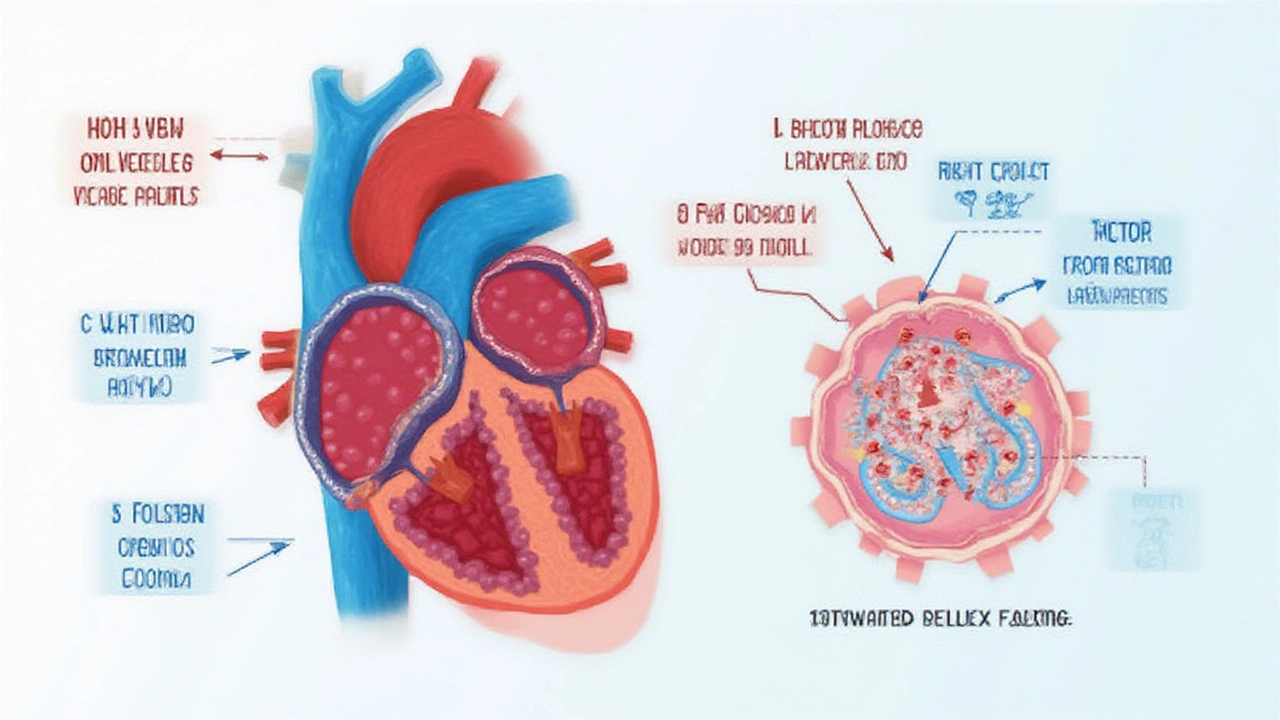If you've seen Capoten in someone's medicine cabinet, you're probably curious—what is it doing there, and how is it helping? Capoten, whose generic name is captopril, is not flashy or trendy, but for people who depend on it, this little tablet keeps things ticking. It was one of the first ACE inhibitors ever brought to market, and it’s still a mainstay in treating high blood pressure and heart issues. Capoten’s story is pretty wild, too. When it launched in 1981, it was the first of its kind. Before ACE inhibitors, managing hypertension often meant putting up with clunky medications and a pile of side effects. Capoten changed the script and set off a domino effect of modern blood pressure drugs.
How Capoten Works and What It Treats
Capoten (captopril) is an ACE inhibitor—this stands for Angiotensin-Converting Enzyme inhibitor. It sounds technical, but the idea is simple: it helps stop your body from making a chemical that tightens blood vessels. When those vessels are relaxed, your blood flows easier, and it takes pressure off your heart. This has obvious upsides if your blood pressure is through the roof, but it’s also a huge help for people with heart failure or those recovering from heart attacks.
Doctors usually reach for Capoten when someone can’t control their blood pressure with diet and exercise alone. If you let high blood pressure roam wild, it’s like having a leak in your plumbing—the damage adds up, hurting your heart, brain, and even your kidneys over time. Capoten doesn’t fix everything instantly. It takes a few hours to kick in, with its strongest effects felt one to two hours after taking a dose. Patients can see changes in their blood pressure within days, but the full benefits—like reduced risks for kidney problems or stroke—build up over weeks and months.
Capoten has a side gig too: protecting the kidneys, especially in people with diabetes. You may have heard how out-of-control blood sugar can damage the tiny filters in your kidneys. Capoten helps dial down blood pressure within the kidneys, which cuts the risk of long-term kidney damage. There’s even data showing that people with type 1 diabetes and protein in their urine get a real benefit from starting an ACE inhibitor earlier rather than later. That’s one reason why Capoten sits right up there on the treatment lists for kidney protection.
You won’t find Capoten in a one-size-fits-all package—dosing varies depending on your health needs. For high blood pressure, the starting dose is often 25 mg taken two or three times a day, but that can be tweaked up or down as your doctor sees how you respond. People with heart failure may need higher doses, sometimes up to 50 mg three times a day if tolerated. Dose adjustments are common, especially if you’re older, have kidney issues, or are taking other drugs that affect blood pressure.
Capoten is rarely a solo act. Doctors often combine it with diuretics (water pills), which help flush out excess fluid, further lowering blood pressure. It can team up with beta-blockers and calcium channel blockers when needed too. But be careful: some meds don’t play nice with Capoten, and doubling up on anything that lowers blood pressure can send things too low. Always check with your doctor or pharmacist before taking anything new.
Here’s an at-a-glance table showing common Capoten uses and doses:
| Condition | Initial Dose | Usual Range | Notes |
|---|---|---|---|
| High Blood Pressure | 25 mg 2-3x/day | 50-100 mg 2-3x/day | May start lower in elderly |
| Heart Failure | 6.25-12.5 mg 3x/day | 25 mg 2-3x/day up to 50 mg 3x/day | Often used with diuretics |
| Diabetic Kidney Protection | 25 mg 3x/day | Up to 50 mg 3x/day | Monitor kidney function |

Side Effects, Precautions, and Real Risks
If you’re thinking about starting Capoten, being aware of its side effects and warnings is a must. Most people do fine, but anyone who tells you medications are always smooth sailing hasn’t read enough med labels.
The most famous side effect of Capoten and other ACE inhibitors is that telltale dry cough. It’s tough to predict who will get it; some people never notice, others find themselves suddenly coughing more, especially at night or when lying down. If it gets annoying, don’t suffer—your prescriber can switch you to a different med if you need relief.
There’s another rare but serious side effect called angioedema. This means sudden swelling, especially around your lips, eyes, or even throat. It can show up days, weeks, or even months after starting Capoten. If your lips or tongue start to balloon or you feel short of breath, get medical help immediately. It’s not common (less than 0.7% of users), but it can be very serious if it happens.
Capoten can also lower your blood pressure too much, especially if you take it with other blood pressure meds or diuretics, or if you’re a little dehydrated. Young people who jump up from the couch and feel dizzy probably won’t panic, but in older adults, this can lead to dangerous falls. Always stand up slowly until you’re sure how your body is reacting.
Your kidneys will notice Capoten pretty quickly, for better or worse. The good: in most people, kidney function is protected long-term. But in people with already-compromised kidneys, starting any ACE inhibitor can lead to changes in bloodwork, mainly rising creatinine or potassium. Monitoring is key here—your doc will check your labs often, especially in the first weeks on Capoten. High potassium (hyperkalemia) can be dangerous, causing upset stomach, muscle weakness, or even irregular heartbeats. People with kidney problems or those taking potassium-sparing diuretics are at higher risk.
There’s some sun-related weirdness too. Capoten can make your skin more sensitive to sunlight or more prone to rashes. If you burn easily, consider a hat and sunscreen, even on cloudy days. Rarely, Capoten can cause skin problems like rashes or itching—these are usually mild, but if they bother you, don’t ignore them.
Captopril even has a funny effect on your sense of taste. Some say things start tasting metallic or just a little ‘off,’ especially early in treatment. Strange but true, and it usually fades after a few weeks. If it sticks around, your doctor might want to try something different.
Here are a few things to keep in mind if you’re thinking about Capoten or have just started taking it:
- Stay hydrated, but don’t overdo it with potassium-rich foods unless your doctor tells you it’s okay. Bananas, oranges, and salt substitutes can raise your potassium even higher if you’re at risk.
- Let every healthcare provider know you’re taking Capoten, especially before surgery. ACE inhibitors can mess with how your blood pressure responds to anesthesia.
- During hot weather, be careful with heavy exercise—Capoten combined with sweating can lower your blood pressure more than you expect.
- Pregnant or planning to get pregnant? Skip Capoten. It’s been linked to birth defects, especially if used later in pregnancy. Your OB will steer you to safer options.
- If you get sick and can’t eat or keep fluids down, skip your Capoten until you’re back to normal and check with your doctor. Dehydration and some illnesses can make side effects much worse.
Capoten can also interact with lots of other meds. These include certain painkillers (NSAIDs like ibuprofen), lithium, and other blood pressure pills. Always double-check before adding anything new.

Everyday Life With Capoten: Practical Tips and What Patients Say
Lifestyle matters even when you’re taking a prescription med. Capoten isn’t a free pass to skip eating well, get no exercise, or avoid medical follow-up. In fact, it works best as part of a bigger plan.
People who use Capoten the longest stress a few things: be consistent with your doses, watch out for double-dosing (it’s easy to forget if you take it two or three times a day), and learn how your body feels on it. Some keep a log for a month, especially right after starting, noting blood pressure readings and any weird feelings. It’s not just for tech geeks; anyone with a notepad or blood pressure cuff can do this, and it helps spot problems early.
The three-times-a-day schedule can be a pain, honestly. Setting phone alarms, pill dispensers, or linking it to daily habits like meals can help. If you miss a dose by just a couple of hours, take it when you remember, but if it’s almost time for the next one, just skip and keep your usual schedule. Don’t play catch-up by taking double doses—it’s a recipe for dizzy spells.
Food doesn’t block Capoten, but taking it 1 hour before meals gives the most predictable results. Certain salty snacks can make your body retain more fluid, making Capoten’s job harder. It doesn’t mean you have to give up every treat, just be aware if you’re noticing swelling or weight gain.
Let’s talk price. Capoten became generic ages ago (captopril), so it’s a lot more wallet-friendly than some newer, brand-name blood pressure pills. According to the FDA Orange Book and GoodRx, generic captopril can cost as little as 80 cents per tablet in the US, and most insurance plans cover it. Plenty of pharmacies offer additional discounts on generics, especially for longer-term prescriptions.
Every year, new blood pressure and heart failure drugs compete for your doctor’s attention. But Capoten hangs on, mostly for folks who can’t tolerate other options or have special reasons to use it. For example, it’s often preferred in people who get rashes from other ACE inhibitors or who need something time-tested for diabetic kidney issues.
Don’t be surprised if your doctor encourages a full court press—diet, regular check-ups, adding (or subtracting) other meds—to get the most out of Capoten. Using a home blood pressure monitor helps you become your own best advocate. If you ever notice swollen ankles, sudden weight gain, pounding heart, or extreme fatigue, don’t wait; call your clinic right away.
For those in the trenches with heart failure or diabetic kidney problems, Capoten is less about “lowering the numbers” and more about keeping you out of the hospital and feeling well enough to do what you enjoy. Small things—like feeling less short of breath or not waking up gasping at night—are signs that it’s doing good work.
Here’s a quick list from what patients and doctors say helps most with Capoten:
- Track your blood pressure and symptoms, especially when first starting or changing your dose.
- Stay in touch with your health team for regular lab work. Early changes in kidney function are often reversible if caught fast.
- Eat a balanced diet with moderate salt and be gentle with potassium, especially if your doctor mentions it.
- Use reminders for doses—missing doses is one of the main reasons it fails to work.
- Stay active. Gentle walking or light exercise boost Capoten’s effects and help with energy and mood.
Capoten might not be the glamorous star of the pharmacy shelf, but in the real world, it gets the job done for stubborn high blood pressure and hard-to-treat heart problems. When respected—and handled with a little know-how—it can help you avoid some of the biggest, scariest health complications out there. If you’re starting it for the first time, keep the conversation going with your doctor, and lean into the routines that set you up for steady progress. That’s where Capoten really shines.









Alexia Rozendo July 17, 2025
Oh sure, Capoten sounds like just the miracle drug everyone needs for high blood pressure and heart failure, right? I mean, who doesn't want to dive into a pool of potential side effects just for that miraculous control? Honestly, reading about the real risks can be way more exciting than the actual benefits sometimes.
Anyway, if anyone here has started on captopril, spill the tea—did you get that classic dry cough everyone talks about? Because if I had a nickel for every time I heard about it, I'd probably buy stock in cough syrup.
And let's be honest, navigating medication can feel like a game of Russian roulette. Thanks for posting some helpful tips on safe treatment—always need those little hacks to survive the med jungle!
Drew Burgy July 19, 2025
Call me paranoid, but I’m convinced that the side effects of Capoten are way underreported. Like, the official lists seem more like a joke than a real warning. It's probably the government's sneaky way of keeping us all medicated and docile while hiding the more sinister fallout.
I mean, seriously, I've read enough forums that mention weird dizziness, kidney issues, and even mood changes. Meanwhile, the pharmaceutical companies act like it’s all sunshine and rainbows.
Don't get me wrong, it might be a lifesaver for some, but I highly recommend people look deeper, ask tons of questions, and judge for themselves before swallowing this pill whole, literally.
Jacob Hamblin July 21, 2025
This post does a good job summarizing the basics of Capoten, but I just wanted to add a bit of a reminder about following the prescription guidelines closely. I know it can be tempting to adjust dosage without consulting a doctor, especially if you're feeling good or having side effects, but that’s a no-go.
Also, be aware of monitoring your blood pressure frequently, especially at the beginning. It helps you and your healthcare provider make better decisions about how you’re responding to the treatment.
One thing I learned through experience: hydration matters a lot. Since Capoten can lower blood pressure, staying hydrated helps prevent dizziness and fainting. It’s a little thing, but it makes a huge difference.
TRICIA TUCKER July 22, 2025
Hey y’all! Just jumping in to say that when I started Capoten, the dry cough was real and annoying, but nothing too crazy to stop me. Still, the tips shared here on safe treatment are golden—especially about starting slow and being patient.
Also, don’t forget to keep your doctor in the loop, especially if you notice anything weird. Side effects can come out of nowhere sometimes!
Btw, anyone here tried any natural or supplemental support alongside Capoten? Would love to hear your take on that.
Dave Tu July 26, 2025
I gotta say, articles like this often oversell the safety of drugs like Capoten. No med is without risk, and we should be brutally honest about that. Captopril has known side effects that can sometimes be life-altering.
Moreover, many will ignore lifestyle adjustments in favor of popping pills. That’s a big problem. Not to mention, the whole industry pushes these medications without adequate patient education.
My advice? Question the convenience, educate yourself fully, and never assume medication is your only option.
Johnna Sutton July 29, 2025
This is exactly the kind of propaganda that keeps people hooked on Big Pharma's profit chains. They throw these 'helpful tips' to make you feel safe, but behind the curtain, they barely disclose the full risks.
If you’re from America or anywhere else, remember your health sovereignty. Demand FULL disclosure and more natural therapies before resorting to such chemicals.
No joke, folks — stay alert and don’t blindly follow medical directions without second opinions.
Andrea Mathias August 1, 2025
Wow, the paranoia here is wild, but honestly, it’s kind of refreshing to see people question the narrative instead of blindly trusting every pill they get! Capoten is powerful stuff, and yeah, it’s not without its nasty side effects. I’ve seen people get totally wiped out by the dizziness alone.
We should all be educated consumers — that means reading, questioning, and reporting what happens to you personally. No shame in speaking up when a med messes you up.
And hey, sometimes the system is flawed, but that doesn’t mean we throw the baby out with the bathwater. Approach with caution but don’t flip out unnecessarily.
Kimberly Newell August 6, 2025
Hey everyone, kimberly here! Just wanna add some useful tips from what i ve learned in my years of managing blood pressure meds. First off, keep a lil journal or notes on how u feel daily when u start any new medication including Capoten. It helps ur doc make better adjustments and u also notice patterns.
Also, dont skip appointments or lab work cuz often these checkups prevent any nasty surprises. And patience is key! Don’t expect miracles overnight, the body needs time to adapt.
Oh, and dont mix it with other meds or herbs without doc approval. Safety first, y'all!
Vinay Keragodi August 10, 2025
Interesting topic! Does anyone here know if Capoten has any notable interactions with food? I understand some blood pressure meds require diet restrictions or timing with meals to optimize absorption.
Also, I’m curious about any long-term effects for people who’ve been on Capoten for several years. How do you manage monitoring and side effects over time?
Thanks for all the tips shared so far. This helps a lot for those of us looking to understand the practical side of treatment, not just theory.
Jacob Hamblin August 12, 2025
@Vinay Good question! Yes, Capoten is typically advised to be taken on an empty stomach, about one hour before meals, because food can reduce the absorption and thus the effectiveness.
As for long-term use, regular kidney function and potassium level monitoring is vital since Capoten affects renal function. Many patients do well with routine labs every few months, but it depends on individual factors.
Glad you brought up the food timing — it’s a detail that surprisingly many miss, leading to less than optimal results.
Cassidy Strong August 14, 2025
As much as I’m all for natural health conversations, let's not disregard the clinical importance of understanding medication facts. Capoten, or captopril, requires precise use and correct grammar in communicating instructions is crucial to avoid dangerous misunderstandings.
Misinterpretation in prescriptions or patient leaflets due to slang, poor punctuation or casual misspelling can have real consequences.
Therefore, educational materials should endeavor to be impeccable in language while accessible, to maximize patient safety and comprehension.